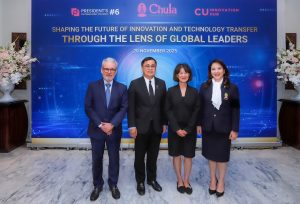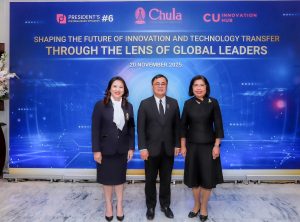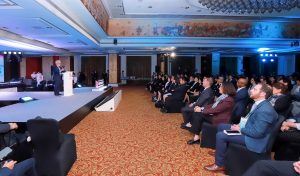Chulalongkorn University, in collaboration with the CU Innovation Hub, continues to strengthen Thailand’s innovation and intellectual property (IP) capacity through the sixth President’s Distinguished Speaker Series, titled “Shaping the Future of Innovation and Technology Transfer Through the Lens of Global Leaders”
The event was opened by Professor Dr. Wilert Puriwat, the President of Chulalongkorn University, followed by keynote addresses from two global leaders in IP, innovation, and technology transfer: Mr. Marco M. Alemán, Assistant Director General of the World Intellectual Property Organization (WIPO), and Ms. Katharine Ku, former Executive Director of the Office of Technology Licensing at Stanford University. The forum also welcomed Ms. Oramon Sapthaweetham, Director General of the Department of Intellectual Property, alongside university executives, government officials, and senior leaders from the private sector, all joining forces to elevate Thai research and IP to the global market.

Professor Dr. Wilert emphasized that the role of universities extends beyond education: “Universities must also drive innovation and improve the quality of life for Thai people. Innovation is not about generating revenue – it is about creating impact. Good innovation begins with innovators, and universities play a central role in nurturing them. Innovators must always come before innovation”

Prof. Dr. Pornanong Aramwit, Vice President for Research and Innovation at Chulalongkorn University, added that the university’s success in IP management stems from a strategic focus on laying the foundation “from the very beginning” of knowledge and research development. “Good IP management must start upstream.” Chulalongkorn has built a collaborative ecosystem with international universities and the private sector, from basic research to commercial technology transfer. A historic achievement includes the successful transfer of high-tech anti-cancer drug technology to the United States, marking Thailand’s first complete innovation transfer in pharmaceuticals to the U.S.

Mrs. Oramon Subtaveetham, Director General of the Department of Intellectual Property, Ministry of Commerce, stated that IP is central to generating new national revenue streams. DIP is committed to supporting all dimensions of IP, including protection, commercialization, enforcement, and market connections through business matching, ensuring research meets industry needs. DIP stands ready to partner with academic institutions to leverage IP as a sustainable driver of Thailand’s economy and to propel the country onto the global innovation stage.

Mr. Alemán explained that a robust legal framework is fundamental for protecting various forms of intellectual creation – whether inventions through patents, product identifications through trademarks, or creative works through copyrights. Such a framework ensures that the IP system can function effectively and generate positive impact. He added that strong administrative systems are equally important to ensure that the IP system serves the needs of all sectors. Effective IP policy must also recognize the distinct purposes of each IP domain – for example, the patent system promotes innovation; the trademark system enhances market organization; and the copyright system supports cultural development and, in certain areas such as software, also contributes directly to innovation.

These components together form what he described as an “intellectual property ecosystem,” in which multiple actors – researchers, inventors, universities, entrepreneurs, and regulators – must work in harmony. When all these elements are aligned, the system can move in the right direction.
Drawing lessons from Stanford University, Ms. Ku encouraged universities in Southeast Asia that aspire to translate research into global innovations and deep-tech startups to begin taking action. She explained that Stanford’s technology licensing office is now 55 years old, and developing an effective system takes time. Institutions in the region can learn from the U.S. and other countries, but must ultimately shape an innovation ecosystem that reflects their own cultural and national contexts. She emphasized that progress today can be much faster than what Stanford experienced, precisely because others can now learn from its journey.

This international forum underscored the synergy between government, academia, and global organizations in driving Thailand toward an innovation-driven economy. By seamlessly connecting research with industry, the initiative marks a significant step in linking Thailand to global innovation networks. The ultimate goal is to commercialize Thai research and technology while fostering the growth of deep-tech startups through the lens of intellectual property and innovation.






